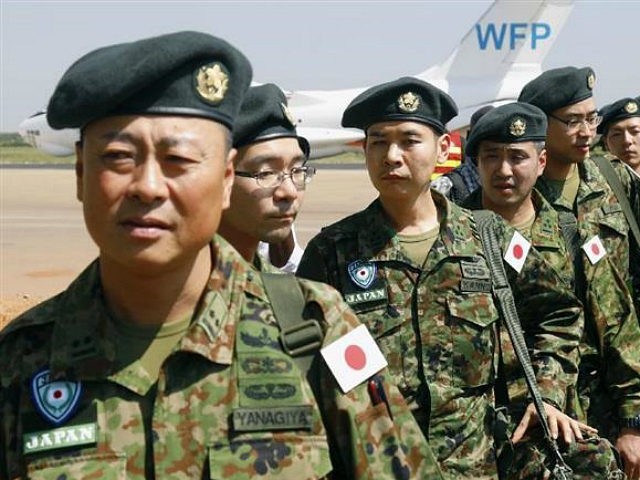Japanese Deputy Prime Minister Aso Taro suggested on Monday that his country’s defense forces might assist the United States in defending Taiwan in the event of a Chinese incursion, before seemingly tempering his remarks and calling for diplomatic efforts to deescalate tensions in the Pacific.
“If a major incident happened, it would not be strange at all if it touches on a situation threatening survival,” Aso asserted, according to Nikkei Asia. “If that is the case, Japan and the U.S. must defend Taiwan together.” He further described the ongoing dispute between China and Taiwan as becoming “extremely intense.”
Japan’s military forces are constitutionally limited to a strict role of self-defense, a provision of the 1947 constitution adopted in the wake of the Second World War. In 2015, however, then-Prime Minister Abe Shinzo oversaw an expansion of legitimate deployments of the Self-Defense Forces, which may permit Tokyo to flex its military might to defend a neighboring nation, should the aggressor in such a conflict prove a security threat to Japan.
Aso later spoke to reporters and asserted his preference for a diplomatic solution between Taiwan and China, apparently falling in line with the rest of the Japanese government, which quickly clarified following Aso’s Monday remarks that Tokyo backed the political status quo, the South China Morning Post reported.
The sovereign democratic state of Taiwan, officially the Republic of China, and the communist People’s Republic of China (PRC) agree in principle on the existence of a sole, unified China, though both affirm themselves to be the legitimate iteration of that “One China.” Taiwan has never been ruled by the government in Beijing.
Many nations withhold formal recognition of Taiwan’s sovereignty because Beijing refuses to have diplomatic relations with any state that recognizes the legitimacy of the Chinese government, a policy known as the “One China” principle. The term “One China policy,” often used in reference to the United States, more vaguely asserts that the world has room for only one China, often without specifying if that China is the Republic of China or the People’s Republic of China.
The deputy prime minister’s remarks follow a bellicose speech by Chinese dictator Xi Jinping on Thursday, the 100th anniversary of the Chinese Community Party, in which he vowed “reunification” with Taiwan. The Communist government in Beijing has never held control of the island.
“Resolving the Taiwan question and realizing China’s complete reunification is a historic mission and an unshakable commitment of the Communist Party of China,” Xi said. “We must take resolute action to utterly defeat any attempt toward ‘Taiwan independence,’ and work together to create a bright future for national rejuvenation.”
Ignoring Beijing’s own provocative rhetoric and repeated violations of Taiwan’s airspace using military jets, the Chinese Foreign Ministry sternly reprimanded Aso, and Japan generally, for meddling in China’s “internal” affairs.
“Japan has committed crimes during World War II, yet it is still obsessed with Taiwan and has not learnt the lessons of history,” said Zhao Lijian, the Chinese foreign ministry spokesman who has made waves for relentlessly pushing the unsubstantiated conspiracy theory that the Wuhan coronavirus originated in the United States.
“Today’s China is no longer the China of the past and will not allow any other country to intervene in its internal affairs. No one should underestimate China’s firm determination and powerful ability in safeguarding its sovereignty,” he said.
Taiwan’s Mainland Affairs Council (MAC) demanded in response to the controversy this week that China “abandon its coercive propositions and bullying actions, and truly become a responsible party committed to regional peace.” It further suggested “Beijing should introduce democratic reforms, such as party competition, and respect for human rights while behaving as a responsible regional player.”
The Empire of Japan acquired Taiwan from the Qing Dynasty in 1895 as part of the Treaty of Shimonoseki. The island rapidly modernized under Japanese rule and began to develop democratic institutions and autonomous government until the militarist faction took power in Tokyo and launched a campaign of conquest in the Pacific. Allied forces turned the island over to Chiang Kai-shek’s nationalists at the end of the Second World War.

COMMENTS
Please let us know if you're having issues with commenting.